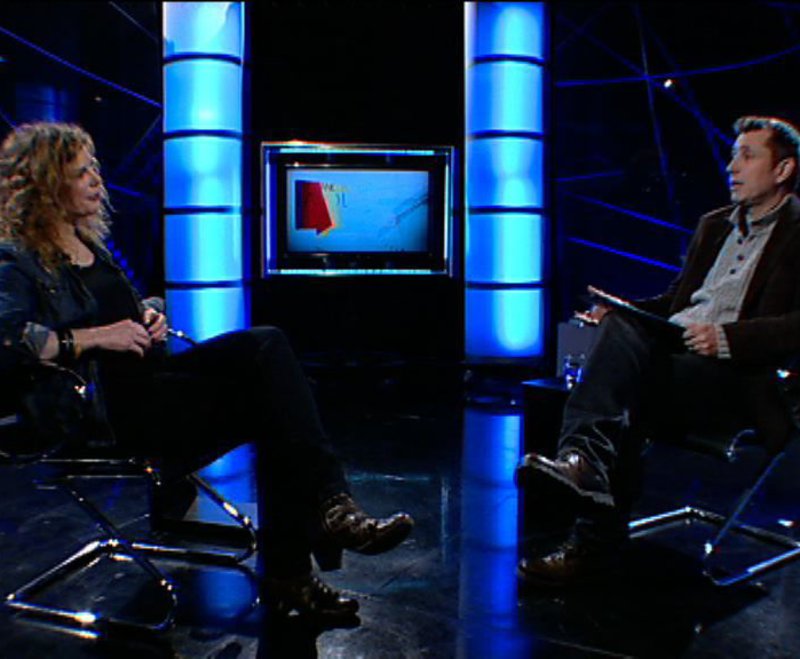Interview
Barcelona behind the lens
Katherin Wermke Every Friday afternoon on El Punt Avui Televisió, Barney chats with an English-speaking expat. For this month's interview he chats with the German photographer, Katherin Wermke.
You are from Germany. How long have you been in Barcelona?
I came in 2000, so for 16 years now.
You are from northern Germany, but then you moved.
I was born in a small village close to Otterberg and I moved to Cologne when I graduated from high school.
What do you miss most from your country?
Small things, such as schwarzbrot, which is a type of black bread, and some other kinds of food. But nowadays with globalisation you can get almost anything anywhere.
Why Catalonia?
Well, at 18 I started working for a German TV channel, then I went to university and they gave me a scholarship at Pompeu Fabra University. I studied philology and audio visual communication there.
So photography came later?
When I finished my studies I decided to stay here, but I needed something more. So, I studied at the Institut d'estudis fotogràfics de Catalunya for five years.
Why photography?
I've always liked images, and I remember even before coming to Barcelona, during a trip to Mexico, my father gave me a Nikon camera and I realised I like taking pictures of new places and visiting new cultures. So, I sort of knew I wanted to become a photographer.
Do you travel a lot for your work?
I am always between four corners of the world: Barcelona, New York, Dubai and Mumbai. After I finished my studies, I didn't know what to do exactly, so I went to study in New York for three months at the School of Official Arts. From there, I got in contact with New York fashion week and since then, in 2006, I shoot there twice a year as a runway photographer.
Then you decided to open your own company.
I founded Barcelona Photographers (www.barcelonaphotgrapher.com) on my own, but I have collaborators, as I love to work in a team. Then I've always liked to teach, so I am teaching portrait classes at the Institut Fotogràfic de Catalunya, as well as a course at the ELISAVA school.
What projects do you do?
We offer photographic products to visitors to Barcelona who want to get to know the city through the eyes of a professional photographer. So we offer photo tours, photo shoots, and we show them photography and also the city: where to get the best food, where to go shopping, which places to see. So, it's a mixture of a tourist guide and a photography instructor. We do personalised courses and courses for groups, for a maximum of eight people.
With your future husband you've just opened a new studio.
Yes, it's called Downtown Studio Barcelona, in front of Santa Caterina market. It'a a large old warehouse; we've completely restored it and now we're doing photo shoots, courses and video production there.
You have a great attraction for India.
I've always been attracted to Asian cultures: I love the colourfulness of the landscapes, of the people, clothes, food, the friendliness of the people, and their open-mindedness. For me, India and Vietnam are the most photogenic countries in the world.
You are involved in an NGO that works with and for children in India.
The idea of Don Bosco was born in Barcelona three years ago, when the other two founders asked me to get involved. Now we are or ganising charity events. I also did a report about the orphanage we work with in southern India. I also do art therapy coaching there with small groups of children: I give them Nikon cameras and ask them to portray themselves and express different emotions. Later on, we print the photos and that's a therapy that helps them to overcome certain fears or traumas. I am also involved with the NGO, Shoot4Change.
Can you give us any tips on taking good photos?
The most important thing is the connection between your mind, your heart and your eyes. There's no secret about it because you can learn the technique in four hours. The rest is going out and hitting the streets, and thinking before shooting a photo.
What inspires you?
That's a very tricky thing. I guess I feel inspired by impacts. It really depends on the day and the mood you're in. I get inspired by faces, by people, places, but it has to be the right moment, which you only find if you really feel it. I find myself taking fewer pictures; in our digital era people take too many pictures, but it's important to take your time at first. My camera only allows me 12 exposures and that's enough for me.
Leave a comment
Sign in.
Sign in if you are already a verified reader.
I want to become verified reader.
To leave comments on the website you must be a verified reader.
Note: To leave comments on the website you must be a verified reader and accept the conditions of use.

